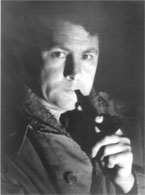|

Gerald Finzi was born in London on 14 July 1901 and spent his early childhood in London. His father died when he was
just seven, and following the outbreak of war Finzi moved with his mother to Harrogate, in Yorkshire. There, Finzi was able
to study with the composer Ernest Farrar (until his departure for the War), and from 1917 with Edward Bairstow at York Minster. Much attracted to the beauty of the English countryside, Finzi moved in 1922 to Painswick, Gloucestershire, where he was able to compose in tranquility. His first published work was By Footpath and Stile, a song-cycle for baritone and string quartet to texts by Thomas Hardy, whose work Finzi
greatly admired.
Rural and musical isolation soon became oppressive and in 1926 Finzi moved back to London. He began studying with RO
Morris, one of the outstanding British teachers of the interwar years. He also became acquainted with Ralph Vaughan Williams,
whose influence he was always to acknowledge and who in 1928 conducted Finzi's Violin Concerto. Other acquaintances in London
included Holst, Bliss, Rubbra and Ferguson - who was to become a life-long friend. In 1930 Finzi gained a teaching appointment
at the Royal Academy of Music, but in 1933 gave up the post after his marriage to the artist Joyce Black and moved back to the country, to Aldbourne, Wiltshire. The same year saw a complete performance of the song-cycle A
Young Man's Exhortation, his first noted success in London.
His burgeoning career was soon thwarted by the outbreak of the Second World War, causing the cancellation of the song-cycle
Dies natalis at the Three Choirs Festival, a performance that could have brought him to prominence sooner. In 1939 the Finzis moved to Ashmansworth Farm, Hampshire.
During the war years Finzi was drafted into the Ministry of War Transport and opened his house to a number of German and Czech
refugees. He founded the Newbury String Players, initially using local amateurs, and conducted them until his death, reviving
much neglected eighteenth-century string music as well as giving several premieres by his contemporaries. With the return
of peace, Finzi began to receive a series of important commissions: 'Lo, the full, final sacrifice', a festival anthem, in
1946, a larger-scale ode For St Cecilia in 1947, a Clarinet Concerto for Frederick Thurston in 1949 (perhaps his
best-known work) and, completed a year later, his masterpiece Intimations of Immortality, for tenor, chorus and orchestra
In 1951 Finzi learned that he was suffering from Hodgkin's Disease, a form of leukaemia, and was given between five and
ten years to live. The discovery in no way lessened his activities, particularly those undertaken for other composers. He
had championed Ivor Gurney in the 1930s and those efforts continued; he was also working on the music of Hubert Parry and
editing the overtures of William Boyce for Musica Britannica. An all-Finzi concert in the Royal Festival Hall in 1954 at last
acknowledged his standing in Britain's musical life, and a commission from Sir John Barbirolli for the 1955 Cheltenham Festival
brought forth the Cello Concerto, Finzi's most ambitious purely instrumental work. He finally lost his fight against illness
on 27 September 1956.
Through Farrar and Vaughan Williams, Finzi belongs to the firm tradition of Elgar, Hubert Parry and Charles Villiers
Stanford, which made his music seem unfashionable in his lifetime. One can’t really speak about experimentation, let
alone modernity, in the case of Finzi, even though some of his lesser-known works completely contradict his popular image
of a lyrical pastoralist. He did, however, have a distinctive voice of his own, most evident in the sensitive songs and choral
works which show an unfailing response to and unity with each poet’s words, resulting from his thorough knowledge of
English literature. In this respect, he resembles Gurney, Roger Quilter and other English song composers of the early 20th
century, though works such as the Cello Concerto and Intimations of Immortality show him more than a miniaturist.
Reprinted by kind permission
of Boosey & Hawkes
|
 |
|
the official website of one of the
most admired British composers
of the 20th Century. His music
embraces a rich variety of moods,
from elegiac lyricism, through
spiritual reflection, to radiant
joy.
eight of Finzi's song cycles
are set to the poems of
|
 |
|
|
 |
|
|
|

